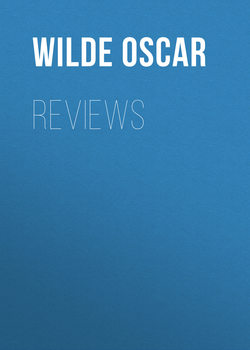Читать книгу Reviews - Оскар Уайльд, Wilde Oscar, F. H. Cornish - Страница 15
HALF-HOURS WITH THE WORST AUTHORS
Оглавление(Pall Mall Gazette, January 15, 1886.)
I am very much pleased to see that you are beginning to call attention to the extremely slipshod and careless style of our ordinary magazine-writers. Will you allow me to refer your readers to an article on Borrow, in the current number of Macmillan, which exemplifies very clearly the truth of your remarks? The author of the article is Mr. George Saintsbury, a gentleman who has recently written a book on Prose Style, and here are some specimens of the prose of the future according to the système Saintsbury:
1. He saw the rise, and, in some instances, the death, of Tennyson, Thackeray, Macaulay, Carlyle, Dickens.
2. See a place which Kingsley, or Mr. Ruskin, or some other master of our decorative school, have described —much more one which has fallen into the hands of the small fry of their imitators – and you are almost sure to find that it has been overdone.
3. The great mass of his translations, published and unpublished, and the smaller mass of his early hackwork, no doubt deserves judicious excerption.
4. ‘The Romany Rye’ did not appear for six years, that is to say, in 1857.
5. The elaborate apparatus which most prose tellers of fantastic tales use, and generally fail in using.
6. The great writers, whether they try to be like other people or try not to be like them (and sometimes in the first case most of all), succeed only in being themselves.
7. If he had a slight overdose of Celtic blood and Celtic-peculiarity, it was more than made up by the readiness of literary expression which it gave him. He, if any one, bore an English heart, though, as there often has been, there was something perhaps more than English as well as less than it in his fashion of expression.
8. His flashes of ethical reflection, which, though like all ethical reflections often one-sided.
9. He certainly was an unfriend to Whiggery.
10. That it contains a great deal of quaint and piquant writing is only to say that its writer wrote it.
11. ‘Wild Wales,’ too, because of its easy and direct opportunity of comparing its description with the originals.
12. The capital and full-length portraits.
13. Whose attraction is one neither mainly nor in any very great degree one of pure form.
14. Constantly right in general.
These are merely a few examples of the style of Mr. Saintsbury, a writer who seems quite ignorant of the commonest laws both of grammar and of literary expression, who has apparently no idea of the difference between the pronouns ‘this’ and ‘that,’ and has as little hesitation in ending the clause of a sentence with a preposition, as he has in inserting a parenthesis between a preposition and its object, a mistake of which the most ordinary schoolboy would be ashamed. And why can not our magazine-writers use plain, simple English? Unfriend, quoted above, is a quite unnecessary archaism, and so is such a phrase as With this Borrow could not away, in the sense of ‘this Borrow could not endure.’ ‘Borrow’s abstraction from general society’ may, I suppose, pass muster. Pope talks somewhere of a hermit’s ‘abstraction,’ but what is the meaning of saying that the author of Lavengro quartered Castile and Leon ‘in the most interesting manner, riding everywhere with his servant’? And what defence can be made for such an expression as ‘Scott, and other black beasts of Borrow’s’? Black beast for bête noire is really abominable.
The object of my letter, however, is not to point out the deficiencies of Mr. Saintsbury’s style, but to express my surprise that his article should have been admitted into the pages of a magazine like Macmillan’s. Surely it does not require much experience to know that such an article is a disgrace even to magazine literature.
George Borrow. By George Saintsbury. (Macmillan’s Magazine, January 1886.)
